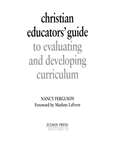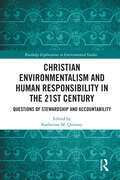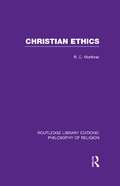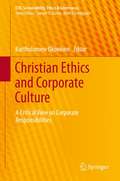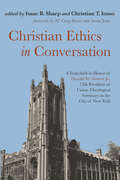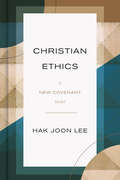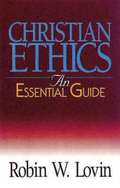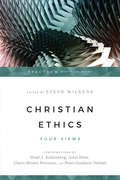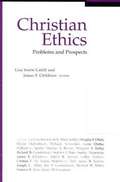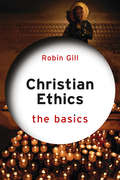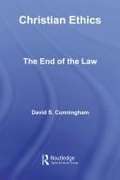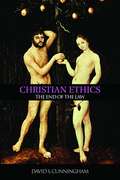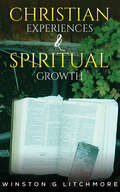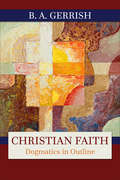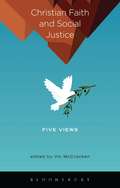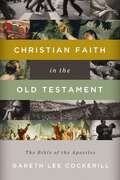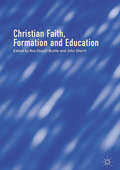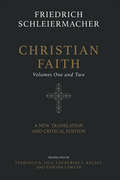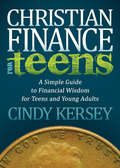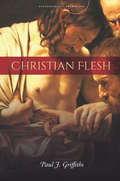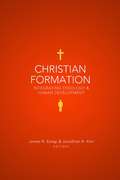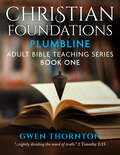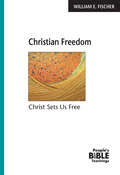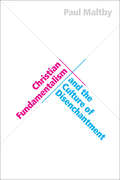- Table View
- List View
Christian Educators' Guide to Evaluating and Developing Curriculum
by Nancy Ferguson Marlene D LefeverThis practical handbook for pastors, lay leaders, and Christian education committees who need help choosing a curriculum that suits their churches beliefs, practices, and membership offers the tools to write ones own curriculum.
Christian Environmentalism and Human Responsibility in the 21st Century: Questions of Stewardship and Accountability (Routledge Explorations in Environmental Studies)
by Katherine M. QuinseyChristian Environmentalism and Human Responsibility in the 21st Century comprises original scholarly essays and creative works exploring the implications of Christian environmentalism through literary and cultural criticism and creative reflection. The volume draws on a flourishing recent body of Christian ecocriticism and environmental activity, incorporating both practical ethics and environmental spirituality, but with particular emphasis on the notion of human responsibility. It discusses responsibility in its dual sense, as both the recognized cause of environmental destruction and the ethical imperative of accountability to the nonhuman environment. The book crosses boundaries between traditional scholarly and creative reflection through a global range of topics: African oral tradition, Ohio artists off the grid, immigrant self-metaphors of land and sea, iconic writers from Milton to O’Connor to Atwood, and Indigenous Canadian models for listening to the nonhuman Mother of us all. In its incorporation of academic and creative pieces from scholars and creative artists across North America, this volume shows how environmental work of its nature and necessity crosses traditional academic and community boundaries. In both form and orientation, this collection speaks to the most urgent intellectual, physical, social, and spiritual needs of the present day. This book will appeal to scholars, researchers, and upper-level students interested in the relationship between religion and environment, ethics, animal welfare, poetry, memoir, and post-secularism.
Christian Ethics (Routledge Library Editions: Philosophy of Religion)
by Robert Cecil MortimerA discussion of the general presuppositions and ideas which underlie the Christian ethical teaching, treating of such subjects as conscience, the concepts of sin and virtue, and the relation between morality and religion. The book also attempts to explain the traditional Christian attitudes towards certain particular matters of conduct; for example, marriage and divorce, gambling, and the rights and duties of private property. Written by the then Bishop of Exeter, this book was originally published in 1950.
Christian Ethics and Corporate Culture: A Critical View on Corporate Responsibilities (CSR, Sustainability, Ethics & Governance)
by Bartholomew OkonkwoThe essays collected in this book discuss the contemporary practice of corporate responsibility by applying the Christian principles of the unity of knowledge and pursuit of truth to the traditional principles of justice, human dignity and the common good, to rediscover a corporate culture that will help transform our economic system and the characteristics required to build an enduring trust in economic relationships. In this volume a select group of management theorists, theologians, legal scholars, economists and ethicists jointly strive to give back to the market economy its ethical and political dimensions. They assess the quality of present day corporate social responsibility, discuss the social and environmental costs of production and argue for an agenda that can be used in modern corporations in their effort to align profitability and growth with business ethics.
Christian Ethics in Conversation
by Isaac B. Sharp Christian T. IossoInspired by Donald W. Shriver Jr.'s leadership of Union Theological Seminary (New York City), Christian Ethics in Conversation brings together essays by members of a stellar faculty--including Gary Dorrien, Larry Rasmussen, Phyllis Trible, and Cornel West--and interdisciplinary colleagues, such as Columbia University biologist Robert Pollack, Chancellor Emeritus of the Jewish Theological Seminary Ismar Schorsch, and Pulitzer Prize-winning Yale historian David W. Blight. The challenges they describe of embracing diversity while facing financial pressure and encouraging social change speak to seminaries, churches, denominations, and faithful individuals facing similar challenges today. The chapters model the kinds of interdisciplinary, interfaith, and inter-institutional conversations foundational to Shriver's approach to Christian public ethics. Shriver and Union Seminary addressed racial justice directly, and colleagues describe lessons learned from an activist-academic who was also a Southerner committed to reconciling and repairing the wounds of history. International conversation partners analyze the place of moral claims in successful social transformation, but those claims also had to be lived out in the seminary's institutional life. Gender justice, full inclusion, and liberation theologies became crucial to Union's identity, but not automatically. The changes required are described by a former dean, board member, worship leader, and several students. All the while, faculty and students of Union and its neighbors were engaged in ongoing debates about honest patriotism, friendship across division, and the dangers of uncritical nationalism, also captured by the book's contributors. With contributions from: M. Craig Barnes Serene Jones Dean K. Thompson Donald W. Shriver, Jr. Gary Dorrien Milton McCormick Gatch, Jr. Larry Rasmussen Cornel West: Janet R. Walton James A. Forbes, Jr. Phyllis Trible Robert Pollack Ismar Schorsch Hays Rockwell Thomas S. Johnson Lionel Shriver David Kwang-sun SUH Roger Sharpe Bill Crawford Robert W. Snyder Eric Mount Joseph V. Montville Helmut Reihlen and Erika Reihlen David Blight Ronald H. Stone Steve Phelps
Christian Ethics in the Work Place
by Raymond L. Hilgert Philip H. Lochhaas James L. Truesdelldiscusses how people can live a Christian life, and still be successful in today's world of modern business
Christian Ethics: A New Covenant Model
by Hak Joon LeeIn this capacious and accessible introduction to Christian ethics, Hak Joon Lee advances a renewed vision of Christian life that is liberative, grace-centered, and justice- and peace-oriented in nature. Responding to key ethical questions of today, Lee applies the moral meaning and implications of the New Covenant in Jesus Christ to twenty-first-century life, characterized by fluidity, fragmentation, division, and violence. Christian Ethics begins by introducing covenant as the central drama and storyline of Scripture that culminates in the New Covenant of Jesus. It presents shalom (the wholeness and flourishing of creation) as God&’s ultimate purpose and God&’s covenant as &“God&’s organizing mechanism of community&” that mediates God&’s work of liberation and restoration. Lee proposes a creative model of Christian ethics based on the New Covenant of Jesus and its organizing patterns, reconstructing the key categories of ethics (agency, norms, authority of Scripture, ethical discernment, etc.) and drawing out four practices—communicative engagement, just peacemaking, grassroots organizing, and nonviolence. The result is a new model of Christian ethics that is inclusive, egalitarian, ecological, and justice- and peace-oriented, which overcomes the limitations of traditional covenantal ethics. In the second part of the book, Lee systematically applies New Covenant ethics to the most urgent and controversial social issues of our time: democratic politics, economic ethics, creation care, criminal justice, race, sex and marriage, medicine, and war and peace. Through his deep, pastoral, and irenic inquiries into these difficult topics, Lee demonstrates a pattern of covenantal moral reasoning that undercuts the dominant neoliberal ethos of individualism and transactional relationship that more and more influences Christian moral decisions. His conclusion is that as covenant has been at the heart of modern democracy, human rights, civil society, and civic formation, a renewed understanding of covenant centered in Jesus can help to heal our broken society and imperiled planet, and to reorganize the fragmented human life in the era of globalization and digitization.
Christian Ethics: An Essential Guide (New Studies In Christian Ethics Ser. #20)
by Robin W. LovinIn this excellent outline of Christian ethics, Robin W. Lovin achieves a balance between the questions and issues which form the core of the study of ethics and the life situations from which those questions arise. Eschewing a sectarian approach which dismisses other understandings of the moral life, Lovin nonetheless lays claim to a specifically Christian understanding of ethics. He begins with basic Christian convictions about the reality of God and human redemption and weaves these convictions into the fabric of moral concerns that are widely shared in contemporary society. He takes note of the problems that arise when Christians try to act on or enforce their convictions in a pluralistic society and recognizes the variety of theological and moral beliefs that are held within the Christian community, as well as in the wider society.
Christian Ethics: Four Views (Spectrum Multiview Book Series)
by Steve WilkensChristian Ethics: Four ViewsBrad J. Kallenberg: Virtue EthicsJohn Hare: Divine Command EthicsClaire Peterson: Natural Law EthicsPeter Heltzel: Prophetic EthicsChristian Ethics: Four Views
Christian Ethics: Problems and Prospects
by Lisa S. Cahill James F. ChildressThis fresh analysis of the "state of the question" in religious ethics charts the course for future study and exploration in the field. Written in honor of James Gustafson, who provides a conclusion, these 22 original and tightly argued essays examine hotly debated controversies on a wide range of topics, from sources of theological ethics to the moral life. At the core of these complementary perspectives is the ever-increasing tension between the particularity of religious and philosophical traditions and the universality of moral discourse. Designed for classroom use.
Christian Ethics: The Basics (The Basics)
by Robin GillChristian Ethics: The Basics sets out clearly and critically the different ways that Augustine, Aquinas and Luther continue to shape ethics today within and across Christian denominations. It assumes no previous knowledge of the subject and can be read by religious believers and non-believers alike. Readers are introduced to Christian ethics from the ground up before being invited to consider some of the most controversial but important questions facing people across the world today. Topics addressed include: Social justice War and peace Migration/immigration Climate change Euthanasia Same-sex marriage Religiously-inspired violence Biotechnology Abrahamic ethics Concise, readable and authoritative, this is the ideal primer for anyone interested in the study of religious ethics and Christianity.
Christian Ethics: The End of the Law
by David S. CunninghamChristian Ethics provides a biblical, historical, philosophical and theological guide to the field of Christian ethics. Prominent theologian David S. Cunningham explores the tradition of 'virtue ethics' in this creative and lively text, which includes literary and musical references as well as key contemporary theological texts and figures. Three parts examine: the nature of human action and the people of God as the 'interpretative community' within which ethical discourse arises the development of a 'virtue ethics' approach, and places this in its Christian context significant issues in contemporary Christian ethics, including the ethics of business and economics, politics, the environment, medicine and sex. This is the essential text for students of all ethics courses in theology, religious studies and philosophy.
Christian Ethics: The End of the Law
by David S. CunninghamChristian Ethics provides a biblical, historical, philosophical and theological guide to the field of Christian ethics. Prominent theologian David S. Cunningham explores the tradition of ‘virtue ethics’ in this creative and lively text, which includes literary and musical references as well as key contemporary theological texts and figures. Three parts examine: the nature of human action and the people of God as the ‘interpretative community’ within which ethical discourse arises the development of a ‘virtue ethics’ approach, and places this in its Christian context significant issues in contemporary Christian ethics, including the ethics of business and economics, politics, the environment, medicine and sex. This is the essential text for students of all ethics courses in theology, religious studies and philosophy.
Christian Experiences & Spiritual Growth
by Winston G LitchmoreChristian Experiences & Spiritual Growth addresses the search for satisfaction with heart and soul happiness. God and being a Christian are seen as its sources. The book defines who is a Christian and how to become one. It dodges none of the trials and temptations in the Christian life but explains how that God as Father, Jesus as Saviour and the Holy Spirit as Guide, Teacher and Comforter, constantly help towards victory, growth, and maturity. Prayer, reading and obeying God’s Word have a pivotal role in the experiences of satisfaction and happiness and the truth that every Christian has a home in heaven is cheering. Readers will gain spiritual knowledge and be able to correct erroneous practice as they read through the book with the Bible alongside, paying attention to the scriptural references on subject areas, put suggestions into practice appropriately and grow spiritually. Reading the book over many sittings will be more profitable than attempting to rush through it. I have employed an explanatory strategy for ease of understanding. For example, I have explained the meaning of some words, phrases, and terms in the body of the book and set out comparative tables to illustrate narratives in the text. These can be used for quick references and reminders.
Christian Faith
by B. A. GerrishThe classic work of Christian theology, which seeks to present the Christian faith in its entirety. Schleiermacher was equally at home in the theological systems of Protestant orthodoxy and the new world of thought shaped by the historical and natural sciences and German philosophy. He follows a confident course through the entire range of themes in dogmatics but leaves both the dogmatic task and the individual themes transformed by a powerful and original mind. A new foreword by B. A. Gerrish summarises the dogmatic goals of The Christian Faith and corrects some common misreadings of his work.
Christian Faith and Social Justice: Five Views
by Vic McCrackenThe Judeo-Christian tradition testifies to a God that cries out, demanding that justice "roll down like waters, righteousness like an ever-flowing stream" (Amos 5:24). Christians agree that being advocates for justice is critical to the Christian witness. And yet one need not look widely to see that Christians disagree about what social justice entails. <P><P> What does justice have to do with healthcare reform, illegal immigration, and same-sex marriage? Should Christians support tax policies that effectively require wealthy individuals to fund programs that benefit the poor? Does justice require that we acknowledge and address the inequalities borne out of histories of gender and ethnic exclusivity? Is the Christian vision distinct from non-Christian visions of social justice? Christians disagree over the proper answer to these questions. In short, Christians agree that justice is important but disagree about what a commitment to justice means.
Christian Faith in the Old Testament: The Bible of the Apostles
by Gareth Lee CockerillSometimes it is easy to view the Old Testament as difficult to apply to our day-to-day lives. As contemporary Christians, we may even wonder whether it is possible for us to establish our apostolic roots in the Old Testament. Christian Faith in the Old Testament helps us complete this daunting task is with ease. In this intriguing and informative study, Gareth Lee Cockerill helps us view the New Testament as a fulfillment of the Old Testament, giving us a broad perspective on Scripture as a whole. In language that is easily accessible to the layperson, Gareth explores the role of each major part of the Old Testament Canon and what part each plays in the total scope of biblical revelation. Additionally, Christian Faith in the Old Testament offers important guidance to contemporary believers about how each part of the Old Testament Canon applies today. This book is the perfect choice for intelligent modern Christians looking to discover their apostolic roots in the Old Testament. Features include:Understand how the Old Testament applies to life todayDiscover the contemporary Christian's apostolic roots in the Old TestamentGain a broad perspective on Scripture as a whole
Christian Faith, Formation and Education
by Ros Stuart-Buttle John ShorttThis book discusses the relationship between faith, formation and education. Rooted in a variety of discourses, the book offers original insights into the education and formation of the human person, both theoretical and practical. Issues are considered within a context of contemporary tensions generated by an increasingly pluralist society with antipathy to religious faith, and debated from interdenominational Christian perspectives. Including chapters by an international team of experts, the volume demonstrates how Christian faith holds significance for educational practice and human development. It argues against the common assumption that there can be a neutral approach to education, whilst at the same time advocating a critical dimension to faith education. It brings fresh thinking about faith and formation, which demands attention given the fast-changing political, educational and socio-cultural forces of today. It will appeal to students and researchers involved in Christian educational practice.
Christian Faith: A New Translation And Critical Edition (T&t Clark Cornerstones)
by Friedrich SchleiermacherThe classic work of Christian theology, which seeks to present the Christian faith in its entirety.Schleiermacher was equally at home in the theological systems of Protestant orthodoxy and the new world of thought shaped by the historical and natural sciences and German philosophy. He follows a confident course through the entire range of themes in dogmatics but leaves both the dogmatic task and the individual themes transformed by a powerful and original mind. A new foreword by B. A. Gerrish summarises the dogmatic goals of The Christian Faith and corrects some common misreadings of his work.
Christian Finance for Teens: A Simple Guide to Financial Wisdom for Teens and Young Adults (Morgan James Faith)
by Cindy KerseyMany parents aren&’t sure where to begin when it comes to teaching their teens and young adults about finances. Christian Finance for Teens will help, giving important information in a way teens can understand about job searching, budgeting, debt, banking, investing, insurance, taxes, and other areas of finance. Author Cindy Kersey has taught a high school finance class (Christian Finance) for tenth- and twelfth-grade students for several years, &“road-testing&” her material on real-world teens to amazing results. Inspired to help other young people, she turned her course curriculum into book format so teens and young adults everywhere can easily understand concepts of personal finance. This material will be useful as they begin their lives as adults.
Christian Flesh (Encountering Traditions)
by Paul J. GriffithsA sustained and systematic theological reflection on the idea that being a Christian is, first and last, a matter of the flesh, Christian Flesh shows us what being a Christian means for fleshly existence. Depicting and analyzing what the Christian tradition has to say about the flesh of Christians in relation to that of Christ, the book shows that some kinds of fleshly activity conform well to being a Christian, while others are in tension with it. But to lead a Christian life is to be unconstrained by ordinary ethical norms. Arguing that no particular case of fleshly activity is forbidden, Paul J. Griffiths illustrates his message through extended case studies of what it is for Christians to eat, to clothe themselves, and to engage in physical intimacy.
Christian Formation: Integrating Theology and Human Development
by James R. Estep Jonathan H. KimFor Christian education professors and students, Christian Formation provides a composite view of human development and learning from integrated theory, theology, and educational practices in the church.
Christian Foundations: Plumbline Adult Teaching Series, Book One (Plumbline Adult Teaching Series #1)
by Gwen Thornton"Study to shew thyself approved unto God, a workman that needeth not to be ashamed, rightly dividing the word of truth." ~2Timothy 2:15 KJVWhen you build your life on a foundation of Bible teaching, you can withstand anything that comes your way. A solid biblical foundation produces steadfast faith, wisdom, success, and an eternity with God.Pastor Gwen Thornton leads readers through a concise study of crucial Bible topics, including creation, the fall of man, the answer to sin, the trinity, Satan, the lineage of Christ, the birth of Israel, angels, and more.The format is designed for groups, churches, home study groups, and church schools. Easy to read and rich in revelation, this faith-filled curriculum will impact new believers and seasoned veterans alike.A sure foundation in Christ and a life built on the Bible will always be rewarded with God's abundant favor and blessings.About the AuthorGwen Thornton and her husband, Philip Thornton, are founding pastors of Legacy Faith Church in Harrisburg, Pennsylvania.Mrs. Thornton has taught Bible curriculum to students from toddlers to adults. She writes her own curriculum because of the lack of high-quality Bible-based materials.A perpetual student of the Bible, Mrs. Thornton makes the study of the Old and New Testaments and teachings of Jesus Christ the foundation upon which her life is based.In answering her call to ministry, Pastor Gwen Thornton believes in a collective responsibility to raise children and adults with a sound spiritual foundation for their daily life.
Christian Freedom: Christ Sets Us Free (People's Bible Teachings)
by William E FischerWhat does “sanctification” mean? What does “justification” mean?For many people, sanctification and justification are just obscure religious words. But through this book, you will come to understand what these words mean—and how they’re crucial parts of your Christian faith and life.Author and pastor William E. Fischer hopes that through Christian Freedom, you will have a greater appreciation of the God who has created you, his Son who has freed you, and his Spirit who has made Christian freedom your personal possession.Bible-based teachings and various freedoms that all Christians have which are not defined in the Bible are also examined in this helpful book!The People’s Bible Teachings is a series of books on all the main teachings of the Bible. Following the pattern set by The People’s Bible series, these books are written for all Christians in an easy-to-read manner. The authors of The People’s Bible are all pastors and professors who have had years of experience teaching others about the Bible.
Christian Fundamentalism and the Culture of Disenchantment
by Paul MaltbyWithin the familiar clash of religious conservatism and secular liberalism Paul Maltby finds a deeper discord: an antipathy between Christian fundamentalism and the postmodern culture of disenchantment. Arguing that each camp represents the poles of America's virulent culture wars, he shows how the cultural identity, lifestyle, and political commitments of many Americans match either the fundamentalist profile of one who cleaves to metaphysical and authoritarian beliefs or the postmodern profile of one who is disposed to critical inquiry and radical-democratic values.Maltby offers a critique that operates in both directions. His use of the resources of postmodern theory to contest fundamentalism's doctrinal claims, ultra-right politics, anti-environmentalism, and conservative aesthetics informs his engagement with contemporary fundamentalist painting, spiritual warfare fiction, dominionist attitudes to nature, and a profoundly undemocratic interpretation of Christianity. At the same time, Maltby identifies some of fundamentalism’s legitimate spiritual concerns, assesses the cost of perpetual critique, and exposes the deficit of spiritual meaning that haunts the culture of disenchantment.
